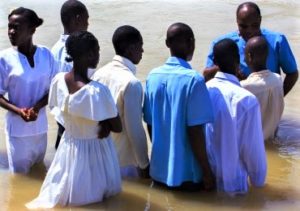 OUR UNIQUE STRATEGY: A Message from Greg Smith, Executive Director for The Haiti Fund
OUR UNIQUE STRATEGY: A Message from Greg Smith, Executive Director for The Haiti Fund
A harsh reality: There are myriads of international relief and development organizations – even Christian ones – that pump large amounts of money into projects in Haiti, often with little or no results to show for it.
That being said: Our experience has been that it really is possible to do tremendous good in Haiti, if you go about it the right way – you definitely have to be smart about what you do, how you do it, and who you do it through.
So first let’s talk about the what you do part.
The longer I’ve been going to Haiti and the more I’ve studied the history of the country, there’s one thing that I’ve become increasingly certain of: The only kind of solution that’s ever going to transform Haiti is going to have to be a God-driven spiritual solution.
There’s clearly only so much we can do to help with physical needs, and we’ll probably always find ourselves “swimming upstream” in that regard – but at the same time, there are huge opportunities for us to do a massive amount of spiritual good, and most of those opportunities are not as heavily dependent on our financial resources.
 The number one focus and priority of The Haiti Fund has always been on finding ways to have the greatest possible impact in the spiritual realm, especially in the areas of evangelism, church growth, and the development of strong Christian leaders in Haiti.
The number one focus and priority of The Haiti Fund has always been on finding ways to have the greatest possible impact in the spiritual realm, especially in the areas of evangelism, church growth, and the development of strong Christian leaders in Haiti.
All of our trips have a clear evangelistic focus, and the people of Haiti are hungry for the gospel – in the 30+ trips we’ve made since 2011 we’ve been blessed to share in close to 200 baptisms.
At the same time, as we’ve developed very close and meaningful relationships with many of our Christian brothers and sisters in different congregations all over Haiti, we often come across humanitarian needs that are both desperate and gut-wrenching. In truth, the needs – and I mean real, real needs – are always overwhelming, and far surpass our capacity and our resources. But we always feel driven to try to do something, and this is where the decisions of “how you do it, and who you do it through” become paramount.
Here are a few components of our vetting process – i.e., the primary considerations that drive all our decisions regarding what humanitarian needs to prioritize, and how to must effectively address them:
1) Even in addressing humanitarian needs, we do it through churches.
2) We work only with congregations that we have an ongoing relationship with and visit frequently.
3) We work exclusively with ministers who are trusted and commended to us by Jeantyrard Elmera, the Haitian evangelist we’ve been working closely with since 2011.
4) We work primarily with congregations that have never had any kind of outside support or assistance from anywhere before, and in many of these places we are the only Americans who have ever even visited their congregation.
5) We focus on finding and addressing the greatest, most life-threatening needs that no other group or organization is addressing – the things we look at and realize, “If we don’t do something about this, there’s nobody else who’s going to do anything about it.”
6) We only do things in situations where we can maintain complete control over the flow of money, and can confirm the completion (or ongoing implementation) of projects on our follow up visits.
